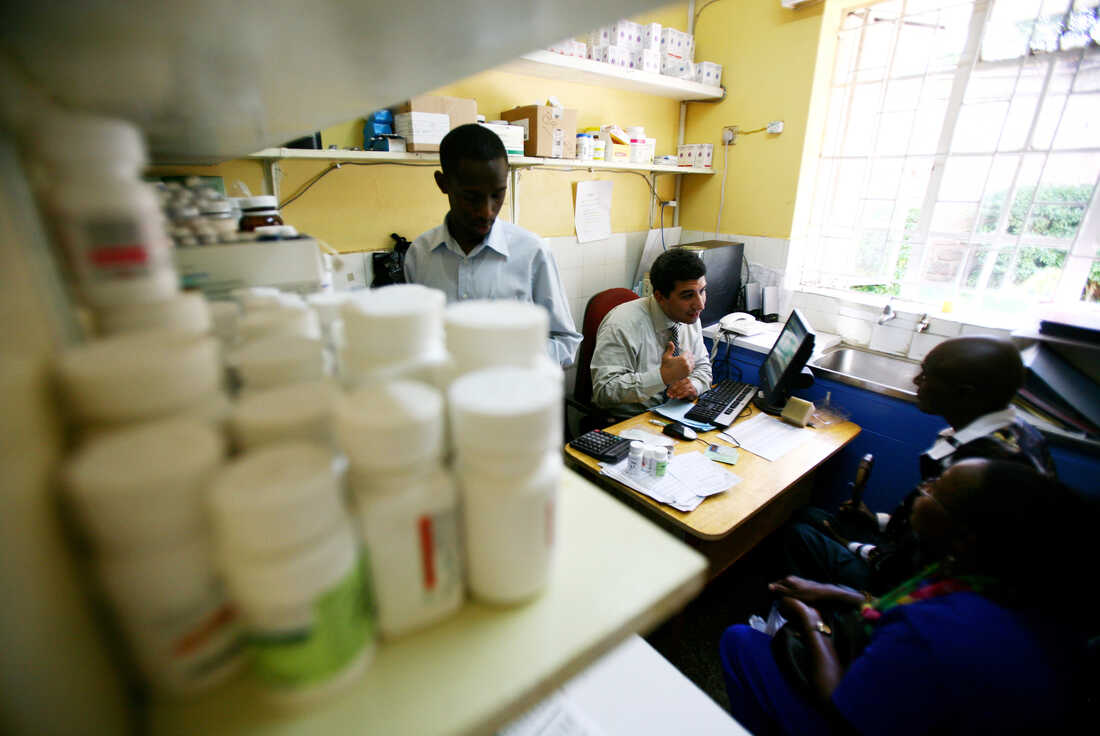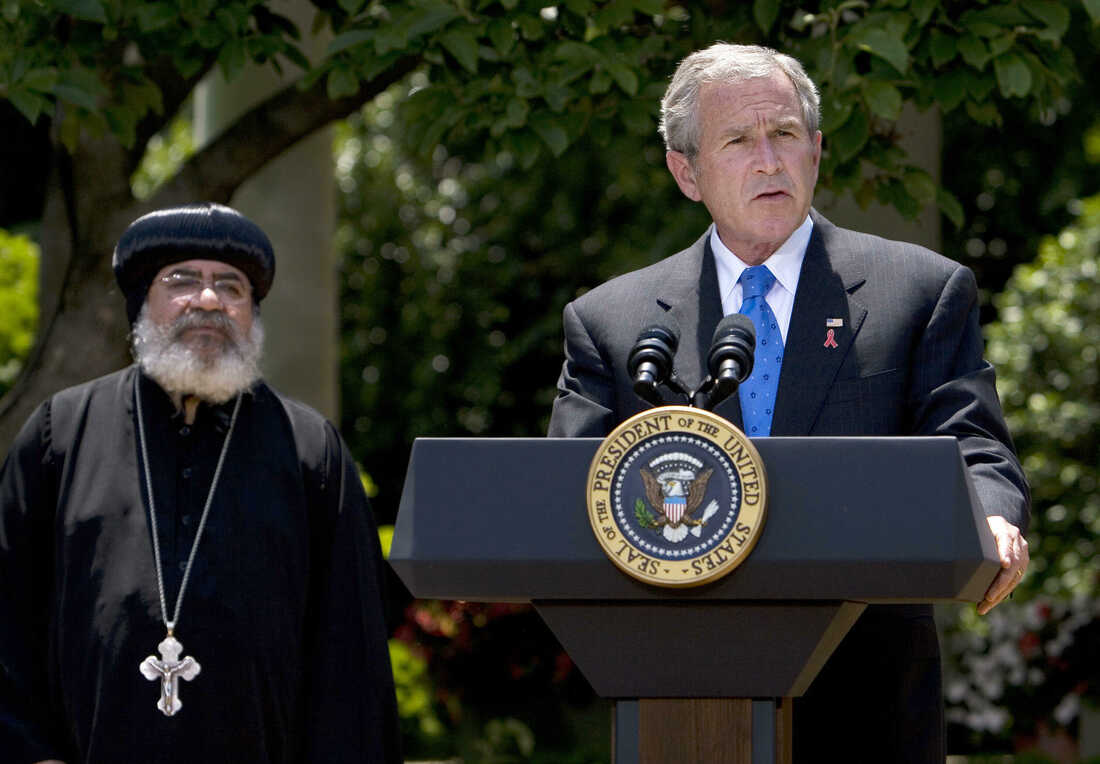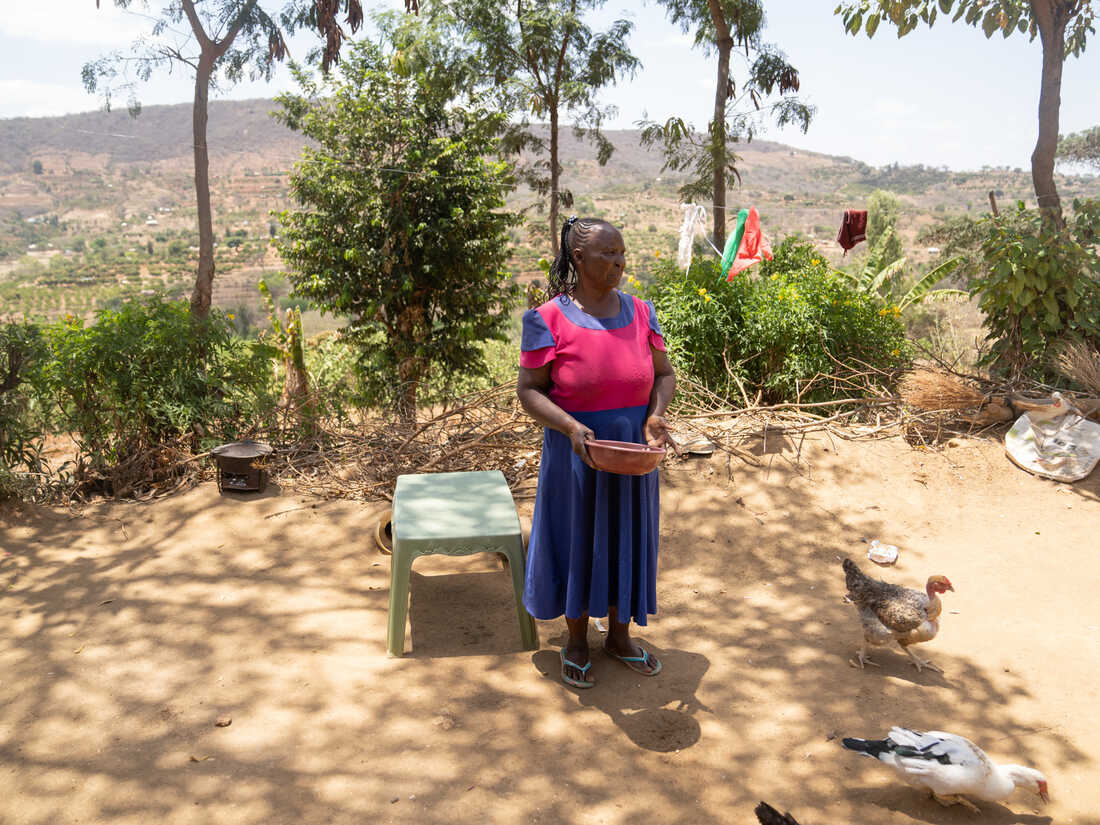What's behind the debate to re-authorize PEPFAR, the widely hailed anti-HIV effort?
By Gabriel Spitzer
PEPFAR, the U.S. multibillion dollar effort to fight HIV/AIDS, funds organizations such as the Coptic hospital in Nairobi, Kenya. Brent Stirton/Getty Images hide caption
toggle caption Brent Stirton/Getty ImagesPEPFAR, the U.S. multibillion dollar effort to fight HIV/AIDS, funds organizations such as the Coptic hospital in Nairobi, Kenya.
Brent Stirton/Getty ImagesHarry Hausler was speaking at an event a few months ago in Khayelitsha, a Cape Town township, where he ran into several people he knew but hadn't seen in years.
Hausler, a family physician, had first met them back around 2007, a period when people living with AIDS in South Africa could not count on getting access to life-saving treatment. These patients were "really emaciated" at that time, says Hausler. "Their immune systems were completely depleted."
When Hausler saw them 16 years later, they were in very different shape.
"They'd started antiretroviral treatment, rebounded, gained their strength and their weight back and subsequently had long and happy lives," he says. "Some of them have had children who have been born HIV-negative because the mothers were on antiretroviral treatment, so they didn't transmit the virus to their children. And some of those children are now graduating from university in South Africa!"
, has little doubt what turned life around for these and millions of other people."It's really incredible what difference PEPFAR has made in South Africa."

President George W. Bush speaks on the President's Emergency Plan for AIDS Relief in the White House Rose Garden in 2007. Bush launched the widely hailed program, which is currently being criticized by factions who say it supports abortion rights. In a 2023 op-ed in the , Bush wrote: "there is no program more pro-life than one that has saved more than 25 million lives." Mandel Ngan/AFP via Getty Images hide caption
toggle caption Mandel Ngan/AFP via Getty ImagesPEPFAR, the President's Emergency Plan for AIDS Relief, has funded antiretroviral treatment for across more than 50 countries in its two decades of existence. It's a rare example of bipartisan politics – launched by President George W. Bush in 2003 and supported by both parties, It's considered one of the most successful and broadly supported aid programs in American history.
And yet Congress could let the program's authorization lapse on Oct. 1.
That wouldn't put PEPFAR out of business, as the program is permanently enshrined in the law. But it's the first sign of uncertainty in support for this bedrock program credited with saving some . And critics are making bold and controversial assertions. "Biden has hijacked PEPFAR to promote abortion," was the headline of a press release issued on Thursday by Rep. Chris Smith, R-N.J.
Said Smith on the House floor ahead of a Thursday night vote: "We ask that PEPFAR remain true to its original mission and respect our norms, traditions and values. We ask that those partner organizations with whom the U.S. government partners to implement PEPFAR programs in ways that are cognizant and respectful of our beliefs and not cross over into promoting divisive ideas and practices that are not consistent with those of Africa."
.Partner groups in Africa worry that such a move would amount to backpedaling on an initiative that has made major strides against AIDS.
What critics of PEPFAR are saying
The complaints about PEPFAR center on the Biden administration's That policy prohibited U.S. foreign aid from flowing to organizations that – with funds raised from their own, non-U.S. government sources – provide abortions, referrals and information on abortion or advocate for abortion services. (U.S. law has long prohibited foreign aid money from being used to provide abortions.)
The Mexico City policy was first instituted by President Ronald Reagan through executive action. It has been rescinded by each successive Democratic administration and restored by each Republican. However, until President Trump, it had only been applied to family planning programs. Trump was the first president to extend it to PEPFAR.
Biden's move to rescind the policy put PEPFAR in the sights of Evangelical Christian groups and other abortion opponents. They say that even though the U.S. program does not directly fund abortions, money is fungible. Organizations could shift other funds to family planning services, providing indirect U.S. taxpayer support for abortion.
"There's a concern about using U.S. tax dollars to prop up and bolster these organizations, given their own stated mission of promoting and performing abortion in Africa," says Travis Weber, vice president for policy and government affairs at the Family Research Council, a Christian think tank that strongly opposes abortion. Weber cites groups such as , whose PEPFAR-funded activities are separate from its broader reproductive health care services, which include abortions.
, director of global health and HIV policy at Kaiser Family Foundation. "So this is really just a political debate, an ideological debate about abortion."Health workers on the ground say that debate could have real effects on millions of vulnerable people.
"For us in Africa it has always been strictly about finding people who need life-saving medication, seeing that they get on it, seeing that they stay on that treatment," says Dave Clark, group chief operating officer at the , which promotes public health in South Africa through research and direct care. "It's always been about preventing new infections, especially in babies and children, and it's about ensuring that those children grow up to live a full and productive life free from HIV and TB [PEPFAR targets tuberculosis and various sexually transmitted infections, in addition to HIV and AIDS]. I know from our experience that this is a profoundly pro-life approach."
What might change without reauthorization
If PEPFAR is not reauthorized for its five-year term, some conservatives say a yearly review of the program would give them more oversight over PEPFAR and the ability to nudge policy away from what they see as supporting abortion access.



